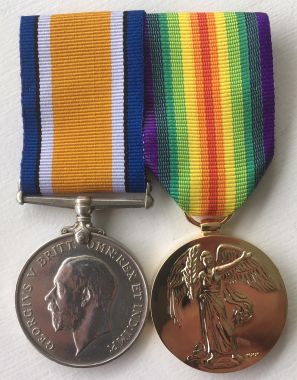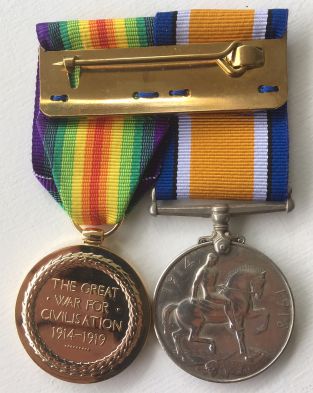Private Henry Masterton
3423, 54th Battalion Australian Infantry
Australian Imperial Force
Australian Imperial Force
killed in action 1st September 1918
aged 22
Peronne Communal Cemetery Extension
Plot V.G. 18
son of William Robert Masterton and Ella Smith, 8 Bellevue Street, North Sydney, Australia
aged 22
Peronne Communal Cemetery Extension
Plot V.G. 18
son of William Robert Masterton and Ella Smith, 8 Bellevue Street, North Sydney, Australia
Genealogy
Henry (known as Harry) Masterton was born in Enmore, Sydney, New South Wales, Australia in 1896, the third child and eldest surviving son born to William (Bill) Masterton, a commercial traveller, and Ella Louise Smith. Bill's father, also William Masterton, a grocer, had emigrated to New Zealand from Edinburgh, Scotland in 1868 with his new wife Christina Forbes. Harry's father Bill had become a copper prospector and miner and known in Australia as "The Redbank Hermit", mining copper in a very remote part of Northern Territory from 1916 until he died in 1961. Harry was a stonemason's labourer before he enlisted.
Further details of Harry and the extended family of Mastertons who can be traced back to the Cramond area near Edinburgh, Scotland can be found at the following link.
His War
Harry enlisted into the 26th Infantry on 8th Jamuary 1917, aged 21. He became part of the 54th Infantry Battalion, 9th Reinforcements. The 54th Battalion was raised in Egypt on 16 February 1916 as part of the "doubling" of the AIF. Half of its recruits were Gallipoli veterans from the 2nd Battalion, and the other half, like Harry, fresh reinforcements from Australia. Reflecting the composition of the 2nd, the 54th was predominantly composed of men from New South Wales. The battalion became part of the 14th Brigade of the 5th Australian Division.
A major German offensive on the Western Front came in late March 1918 and the 5th Division moved to defend the sector around Corbie. The 14th Brigade took up positions to the north of Villers-Bretonneux and held these even when the village fell, threatening their flanks. Thrown into the line to stem the tide, the 54th mounted a strong defensive action around Villers-Bretonneux, during which its entire headquarters, including the battalion's commanding officer, Lieutenant Colonel David McConaghy, were killed.
Once the German offensive had been defeated, the Allies launched their own offensive in August 1918. The 14th Brigade did not play a major role in these operations until late in the month, but its actions, including those of the 54th Battalion at Anvil Wood, were critical to the capture of Peronne, which fell on 2 September 1918, the day after Harry Masterton was killed,. For their actions during the fighting in Anvil Wood, around Peronne, in early September, two members of the 54th Battalion – Alexander Buckley and Arthur Hall – received the Victoria Cross. The medieval walled town, surrounded by an unfordable river, was heavily defended by machine-gun nests, and during the assault the battalion, under the command of Lieutenant Colonel Norman Marshall, advanced through marshy ground over foot-bridges under fire while breaking into the position.
The action was successful but at the cost of 2 officers and 25 Other Ranks killed - including Harry Masterton.

Australian Imperial Force unit war diaries - AWM4 23/71 - 54th Infantry Battalion on the day Harry was hit by a shell.
Australian Red Cross enquiries throw further light on the circumstances of Harry Masterton's death from those who saw him die. For example:
Masterton was a Pte in 11 Pltn., C Coy., 54th Battn., medium height, thin, dark... They [he and Pte Howard] were killed during the hop over at Halle on road to Peronne
on 1/9 about 6.30 to 7 a.m. by a shell, which ?? of them. I was wounded by piece of it but was able to walk back. Masterton was killed instantly,
he was a pal of mine, a good soldier and a good sport...They were buried at Halle, but I was evacuated and did not see burial or grave. Pte T. Lobley.
Masterton and I first met in France. We were together in C. Company. I knew him very well. He was short, about 5 ft 4 inches, of dark complexion and clean shaven.
At Peronne on the 1st of September 1918 I saw him after he was killed. We had just left the support trenches and were going up to take part in a stunt. He was lying
where he fell. A shell had killed him instantly. I did not see him hit. - Private E. Hall, No. 776
His mother Ella died some 14 months later.

Henry Masterton's grave in Peronne Communal Cemetery Extension. Photo courtesy of Mark Upton
The Sydney Morning Herald
FUNERALS.
MASTERTON -The Friends of ALFRED, FRED,
VERA, VICTOR,
MAISIE, SYLVIA,
JAMES and
the late HARRY MASTERTON (killed in action) are
Invited to attend the funeral of thelr late dearly beloved MOTHER to move from her late residence,
TO-DAY (Monday), at 1.30 p.m., for the Church of England Cemetery, Rookwood.
The Sydney Morning Herald
Family Notices
Monday 10 November 1919
Note: Alfred (Otto Alfred) and Fred (Fritz Walter - who also served with the 54th Battalion) were sons of Ella Smith's first husband, Ludwig Leuenberger. The father of Vera, Victor, Maisie, Sylvia, James and Harry was Bill Masterton.
Other Sources
- Henry Masterton Nominal Roll
- Henry Masterton Service Record
- Commonwealth War Graves Commission
- Australian Imperial Force unit war diaries - 54th Infantry Battalion. AWM4 23/71.
1 September 1918 - Australian War Memorial
- Henry Masterton Roll of Honour Details
- Australian Red Cross Society Wounded and Missing Enquiry Bureau Files. 3423 Private Henry Masterton
- Medals: Victory and British War Medal


Photographs of Harry's medals by Mark Upton (British War Medal - the original, and Victory Medal - a replica)